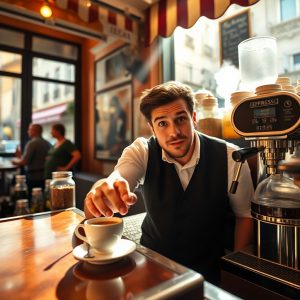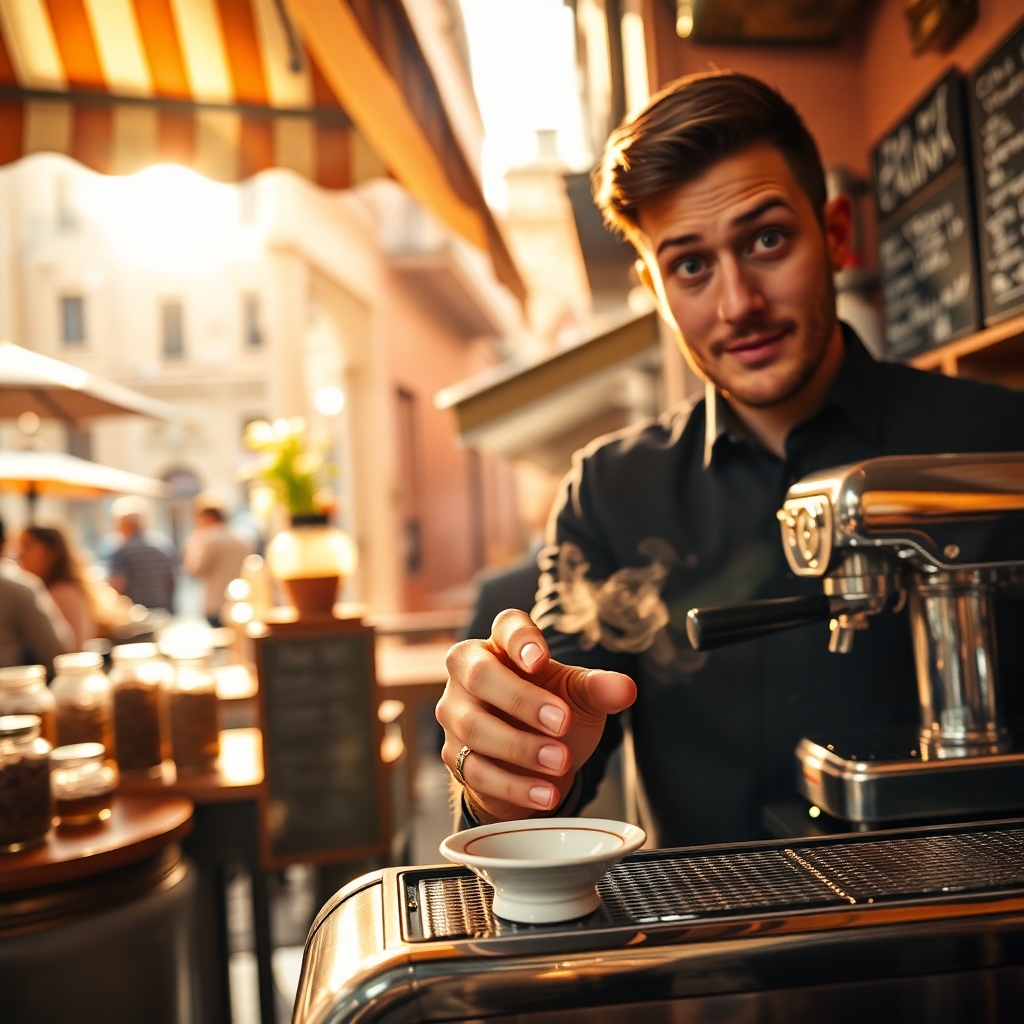I landed in Rome clutching my rolling suitcase like it was a life raft and I’d just survived a transatlantic storm of jet lag. The taxi driver deposited me in front of a café that was more sunlit rumor than building—no walls to speak of, just a patchwork of awnings and the smell of coffee floating through the morning like good gossip. I had memorized one sentence of Italian on the plane—“Vorrei un caffè grande, per favore”—and I was fiercely, irrationally proud of it.

Inside, the place was all clatter and chrome. Cups chimed against saucers. The espresso machine exhaled like a retired dragon who’d taken up yoga. The barista—a calm man in a black vest and an expression like he’d seen everything, and a little bit more—looked at me with a polite curiosity.
I squared my shoulders. “Vorrei un caffè grande, per favore.”
He nodded as if I’d just recited Dante, then produced a tiny porcelain cup that looked like it belonged to a particularly sophisticated dollhouse. It contained a liquid the color of secrets.
“I said large,” I tried again. “Grande.”
“If you can finish this in under two seconds,” he said in English, “you’re ready for Italy.”
I blinked, tilted the cup, and the espresso vanished as if it had been waiting for its cue.
He nodded solemnly. “Benvenuto.”

The caffeine hit my bloodstream like an orchestra tuning all at once. The edges of the café sharpened; the tiles became more tile-like, the sunlight more sun-like. My suitcase suddenly weighed less and my optimism weighed more. I was, apparently, ready.
“Another?” he asked.
“I don’t know if my soul can vibrate at a higher frequency,” I said.
“Then un cappuccino,” he suggested. “But it is almost eleven.” He checked the clock that hung above the door. “After this time, cappuccino is… a baby blanket.”
“I could use a baby blanket,” I said. He smiled and foamed milk with the gravitas of a priest performing a blessing. He slid the cup to me with a flourish; the milk foam bore a heart that looked like it had taken lessons in self-esteem.
“What’s your name?” he asked.
“Alex.”
“I am Marco. You are here for how long?”
“Two weeks.”
“Two weeks,” he repeated, like he was doing polite arithmetic. “Enough to make mistakes properly.”
I sipped. It tasted like cooperation between nations.
Outside, the city moved in the rhythms of honks and footsteps. A scooter zipped past with a dog in the front basket wearing goggles. A tour guide marched by with a folded umbrella held upright like a wand of authority. Rome didn’t seem interested in impressing me; it was busy being Rome.

A woman slid onto the next stool and tapped the counter with a coin. “Caffè,” she said, and Marco produced an espresso that she took like a shot and replaced with the same coin, an exchange so smooth it looked choreographed. She noticed me admiring it.
“Practice,” she said. “And thirst.”
“Do you all take coffee like a dare?” I asked.
She smiled. “In Italy, coffee is not a drink. It is a punctuation.”
“Punctuation?”
“Full stop. Comma. Exclamation! It depends.”
“Mine felt like an ellipsis that turned into fireworks,” I said, and she laughed.
“Then you will do fine,” she said, and disappeared back into the street, already part of the city’s sentence.
Marco leaned on the counter. “You have plans, Alex?”
I produced my guidebook with the confidence of a student brandishing an overdue assignment. “All of them,” I said. “The Colosseum, the Forum, the Vatican, the… trattorias.”
He winced. “If you follow only this,” he tapped the book, “you will see everything and understand nothing. Better to see less and taste more.”
“Like coffee,” I said.
“Exactly.”
He drew a small map on the back of a receipt. It looked like the treasure maps I’d drawn as a kid, full of arrows and generous curves. “Here is a fountain that is not in your book,” he said. “It sounds like coins, but it is only water and wishes. And this street—good for getting lost. And here, a bakery where the owner will not smile, but her pastries do.”
I tucked the map into my pocket. “How do I pay you for this concierge service?”
“You already paid,” he said, and tapped the empty espresso cup with a gentle knuckle.

The day unfolded with a clarity that felt almost undeserved. The fountain he’d recommended occupied a quiet square where sun splashed and pigeons held low-level staff meetings. I sat on the edge and listened to the trickle, the soft coins of water, and let the city climb into my bones. At the bakery, a woman with the emotional availability of a marble bust handed me a maritozzo so airy I wondered if it had achieved enlightenment. It left a constellation of powdered sugar on my shirt; I wore it as a proud new galaxy.
By late afternoon, jet lag ambushed me behind a Roman pine. I stumbled back toward the café like a salmon returning to its birthplace. Marco saw me coming and, without a word, pulled a shot. I sipped it in one smooth arc. The room brightened again, as if someone had remembered to plug in the sun.
“You lasted longer than most,” Marco said. “Some people crash at noon and wake up in Florence.”
“I can feel all my ancestors speaking at once,” I said. “They’re saying, ‘Don’t waste this.’”
“Smart ancestors,” he said.
The next morning I arrived at the counter like a local with imposter syndrome. Marco lifted an eyebrow. “Ready?”
“Test me,” I said.
He set down the tiny cup, and I treated it like a ritual object. The espresso hummed with quiet confidence. I blinked, and it was gone. Two seconds, maybe less. The room applauded. Okay, not the room, but in my head a small chorus of angels nodded approvingly.
“Now you are dangerous,” Marco said. “You will go faster than your shadow.”
“Where should I point my dangerous self?”
He sketched again on a receipt. “Today, find this market. It smells like basil and bargaining. Buy tomatoes even if you do not need tomatoes. Talk to the old man who stacks the fennel like a Renaissance scholar stacks books.”
The market was a carnival of edible color. Peppers glowed. Bottles of olive oil caught the light and held it captive. I met the fennel scholar; he moved with monastic precision and spoke with the eagerness of a man who believed vegetables could save your soul. When I asked for just one fennel bulb, he gave me two and said, “One for now, one for when you realize you are wrong.”
Back at the café that afternoon, I placed the extra fennel bulb on the counter. Marco eyed it. “A bold centerpiece,” he said.
“It’s for you,” I said. “A gift from my new mentor.”
Marco sniffed it, nodded, and tucked it beneath the counter like a secret weapon.
A rhythm took hold. Mornings began with the tiny thunderclap of espresso, a ritual so concise it felt like grammar for my day. I learned to keep coins ready and questions shorter. I learned that “Where is…?” could be replaced with “Is there…?” and that a shrug could be a paragraph. I learned that standing at the bar, not sitting, meant you were part of the current, and the current moved swiftly but kindly.
On the fourth day, a tourist wandered in and loudly ordered “a large coffee.” Marco gave me a sly look and handed the man an espresso. The tourist stared at it like it was a practical joke. “This is not large,” he protested.
“If you can finish this in under two seconds,” Marco said, “you’re ready for Italy.”
I watched the man consider the terms of his new reality. He sipped, and his face transformed from suspicion to revelation. He laughed, tossed it back, and thumped the cup down like a gauntlet. “I get it,” he said.
“That is the point,” Marco told me later, wiping the counter. “The size is not in the cup. It is in the moment.”
“Poetic,” I said.
“Practical,” he countered. “If the moment is strong, you need less of it.”
On my last morning, I arrived earlier than usual. Rome yawned and stretched; the city was still in its bathrobe. Marco was wiping down the machine, humming something old and confident.
“Two seconds?” he challenged, sliding me a cup.
“One and a half,” I said. The espresso was darker than sleep and brighter than daybreak. I let it anchor me to the moment, then let it go.
“Benvenuto,” he said again, but softer this time, a word not just for arrival but for belonging. He reached under the counter and produced the fennel bulb, now transformed into a small jar of pale-green, licorice-scented marmalade. “For you.”
“You made fennel marmalade?” I asked, delighted and terrified.
“With orange and patience,” he said. “Spread thin. Like joy.”
I tucked the jar into my bag, alongside the guidebook, now dog-eared and humbled. I paid, slid the coins across the counter, and hesitated.
“What’s the Italian for thank you, but richer?” I asked.
He considered. “Grazie is enough. The rest, you show.”
So I did. I returned the tiny cup to its saucer with care, as if the porcelain contained a map of the city—because it did, in a way. The map was small but intense; it told me the important roads were the ones between people: the nod of the barista, the gruff generosity of the baker, the fennel scholar’s stubborn kindness. I stepped back into the sun, awake in a way that wasn’t only chemical.
At the threshold I turned. Marco lifted two fingers in a salute that meant see you when you’re thirsty again. And I would be. I was already.
Outside, the dog in goggles barked once, as if to say, hurry up. The day began, punctuated by a small, perfect exclamation point.
